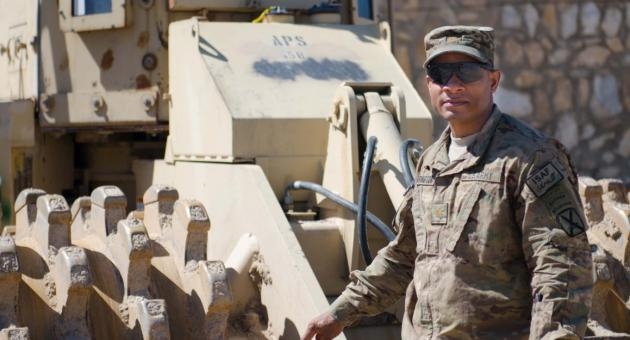Army officer shores up planning skills at Temple Ambler

Temple Community and Regional Planning graduate student Terrence Harrington came to urban planning from a decidedly atypical angle, receiving inspiration from the unlikeliest of sources — George Costanza.
“I was watching an episode of "Seinfeld" where George was pretending to be a city planner. It was the first time that I thought about urban planning as a career,” said Harrington, a career military officer with more than 17 years of service to his country. “At the time I was being redeployed to Iraq, but I knew that city planning was my future.”
It’s a future firmly rooted in his military career, which has incorporated planning in some aspect at nearly every turn. While it might have been a comedy that helped the planning seed germinate, his dedication to ensuring the safety, security and well being of his fellow soldiers at home and abroad in locations such as Iraq, Afghanistan, Kuwait and South Korea is no laughing matter.
“I think my interest in planning first started at Ft. Stewart in Georgia where I was a facilities officer and began to understand the facilities planning process,” said Harrington, a United States Army major currently serving as a Brigade Engineer in Afghanistan. “Later while I was serving in Iraq I was a ‘Forward Operating Base (FOB) Mayor,’ which is similar to a city manager. I felt like someone was trying to tell me something.”
That “voice” was clearly speaking to Harrington from the very beginning. In Korea, for example, he coordinated logistical support, physical security and administration for a 100-member unit. In 2004, he was an assistant brigade operations officer, coordinating facilities and housing for a 900-person unit. In Baghdad, Iraq, he was a company commander and base camp manager, managing $400,000 in construction projects.
From 2009 to 2010, as director of engineering and housing, Harrington was responsible for all U.S. Kuwait base camps in support of the defense of Kuwait and during Operation Iraqi Freedom and Overseas Contingency Operations.
In Kuwait, Harrington was involved in developing stormwater management plans for base camps to allow for some normalcy of life during the rainy season, and he worked with the director of public works to develop a power distribution plan during the summer months when temperatures reach 115 to 130 degrees and outages are common.
Currently he is helping to supervise the planning and execution of U.S. troop withdrawal and base closures out of Afghanistan while also being responsible for the planning and execution of all engineering missions — both combat and construction.
And amid his decorated military service, Harrington made a stop at Temple University Ambler to earn a master’s degree.
“I think my military training has helped greatly in the program and vice versa,” Harrington said. “In the military there are a lot of opportunities for analytical thinking — how to resolve problems based on current facts while managing your assets. Temple’s planning program provided me with the technical understanding and the theoretical processes that I needed to explore a broad spectrum — economic, environmental, societal, geographical — and see how they interrelate.”
Seven years and several tours overseas later, Harrington is about to complete the long journey to finishing his degree. While thousands of miles — and one ocean — will prevent him from attending graduation personally, on May 16, he’ll certainly be there in spirit.
“It’s such a great sense of accomplish. I think in my situation, a lot of people would have quit, but the institutional and faculty support I’ve received has been awesome,” he said.
Harrington’s advice to fellow active duty service men and women who might be thinking about higher education is simple:
“Do it.”